- Joined
- Dec 31, 2015
- Messages
- 1,889
- Points
- 83
https://www.yahoo.com/news/no-muslims-no-single-women-housing-bias-turning-160125827.html
No Muslims, no single women: housing bias turning Indian cities into ghettos

By Rina Chandran
Reuters January 23, 2017

By Rina Chandran
MUMBAI (Thomson Reuters Foundation) - On the inauguration of U.S. President Donald Trump, an Indian real estate company ran an advertisement with the slogan 'Homes that don't discriminate', calling for an end to prejudice in India's housing market based on gender, religion or caste.
While the ad was unusual, the sentiment was familiar to millions of Indians who have tried to rent or buy city homes only to be denied because they were single, ate meat, were of a certain caste or from a certain region.
Informal rules and discrimination by Indian landlords to keep out religious minorities and single people are eroding the multi-cultural nature of India's cities and dividing communities into ghettos, analysts say.
"It's 2017 - and we're still encountering discrimination," said Rishi Dogra of NestAway Technologies that ran the ad.
"People should be able to move freely and find a living space anywhere in the country," said Dogra, marketing head for the company founded by four young male graduates after they had trouble finding a home in Bengaluru.
Such discrimination has forced many people to the suburbs, making Indian city centres less diverse and cosmopolitan, with high rents already making them unaffordable to poorer workers.
Mumbai, India's financial hub and a magnet for migrants from across the country, has traditionally had enclaves for Catholics, Parsis, Bohri Muslims and others. They set up housing societies, or co-operatives, to help other community members.
As the city grew and drew more migrants, powerful housing societies have often denied homes on the basis of religion, caste, food preferences and even professions.
The divide grew after bloody Hindu-Muslim riots in 1992-93 and still persists, said Zakia Soman, a co-founder at Bharatiya Muslim Mahila Andolan, a non-profit organisation for Muslim women.
A Facebook group called 'Indians Against Discrimination' was set up in 2015 after a young Muslim woman was asked to leave her flat a week after she moved in, because of her religion.
"When it comes to living spaces, we have become very insular," Soman said.
"The city is getting increasingly ghettoised as a result, weakening our social fabric and polarising us further. That doesn't bode well," she said.
Local courts have ruled against discrimination by housing associations in several cases, but there have also been contradictory rulings.
DISCRIMINATION
In a 2005 case, India's top court ruled in favour of a Parsi housing society in Ahmedabad, saying it could limit its membership to Parsis and not admit others.
"The constitution guarantees our right to equality, but housing societies can still frame their own guidelines which may be discriminatory," said Vinod Sampat, a real estate lawyer.
A draft housing policy for Maharashtra state, where Mumbai is located, has dropped a clause that prevents discrimination in housing. This may leave those looking to rent or buy property with fewer protections, Sampat said.
Government officials have said non-discrimination is already protected by the constitution, so there is no need for the clause.
That has not reassured people like Shikha Makan, who made a film called 'Bachelor Girls' on housing bias against single women - including Bollywood actors - in Mumbai.
"Not being able to find a home in a big city like Mumbai is a shame," she said.
"It is marginalising single women and other minorities."
(Reporting by Rina Chandran @rinachandran, Editing by Ros Russell. Please credit the Thomson Reuters Foundation, the charitable arm of Thomson Reuters, that covers humanitarian news, women's rights, trafficking, corruption and climate change. Visit news.trust.org to see more stories.)
https://www.bbc.com/news/world-asia-india-43972841
Caste hatred in India - what it looks like
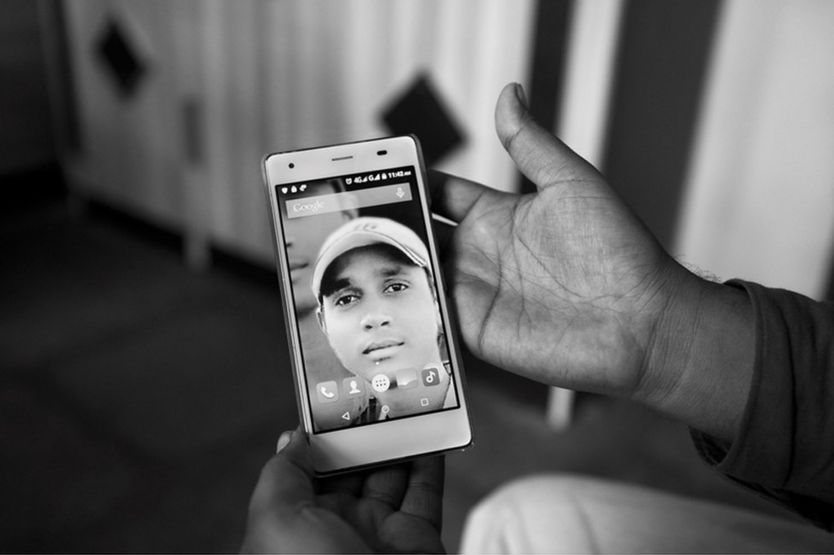
Image caption A photo of Sagar Shejwal
A recent exhibition in the Indian city of Mumbai documented Dalit (formerly known as "untouchable") families that have lost a loved one because of discrimination and violence. The photographs by Sudharak Olwe capture the prejudice that remains a reality for millions of Dalits.
They are some of the country's most downtrodden citizens because of an unforgiving Hindu caste hierarchy that condemns them to the bottom of the heap.
Tens of thousands of Dalits recently took to the streets to protest against a Supreme Court ruling - they said it sought to weaken a law that was designed to protect them.
The court had said that the Scheduled Caste and Scheduled Tribe (Prevention of Atrocities) Act, popularly known as the SC/ST Act, had been "misused" in the past but the order sparked massive outrage and the federal government asked the court to review its decision.
The exhibition's organisers say they chose these stories in response to the court's decision in the hope that the law would not be diluted further. They say these cases - all from the western state of Maharashtra - show that "the victims are ready to fight but there was no mechanism to help them".
Despite the laws to protect Dalits, more than 40,000 crimes against lower castes were reported in 2016 alone, according to official statistics. In the past, conflicts between Dalits and upper castes were restricted to fights over land, wages, water, housing and the practice of untouchability.
However, according to activists, rising aspirations among young Dalits have fuelled violence against them by upper-caste community members who are unable to accept this.
Found in a field
Sagar Shejwal, a 24-year-old nursing student, travelled to the town of Shirdi in May 2015 to attend a friend's wedding. During the trip, Mr Shejwal went to a liquor store with two of his cousins and his phone started to ring while he was there. His ring tone was a song that paid tribute to Dr B R Ambedkar, a Dalit icon and revered Indian leader.
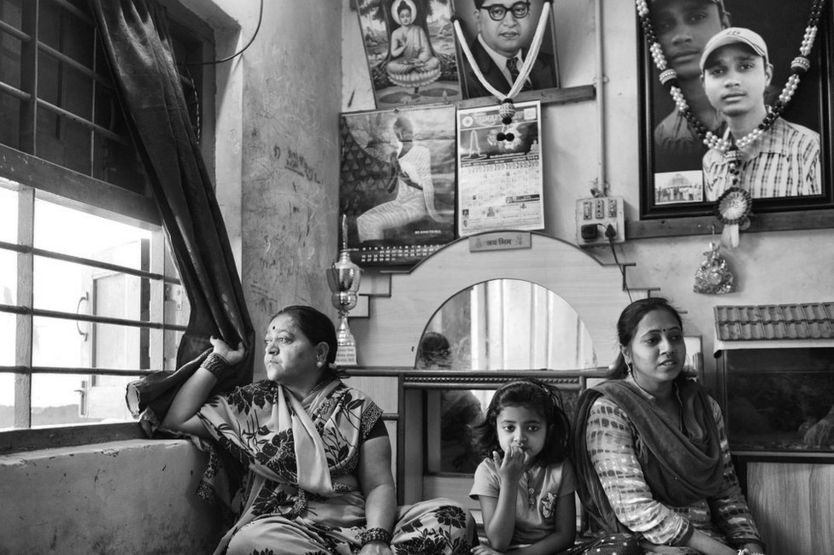
Image caption Sagar Shejwal's mother (L) and sister (R)
According to the police complaint, a group of eight men who had been drinking outside the shop objected to the ring tone and asked him to change it. The verbal spat reportedly turned violent and the men allegedly hit Mr Shejwal with a bottle, kicking and punching him before taking him away on a motorbike.
Police say they found his body hours later in a field. His autopsy showed that he had suffered multiple fractures - allegedly caused by a motorbike being run over him repeatedly.
The accused men have been granted bail.
Found in a quarry
Manik Udage, 25, was allegedly beaten to death with a steel rod in 2014 because he had organised a grand event to celebrate the anniversary of Dr B R Ambedkar's birth.
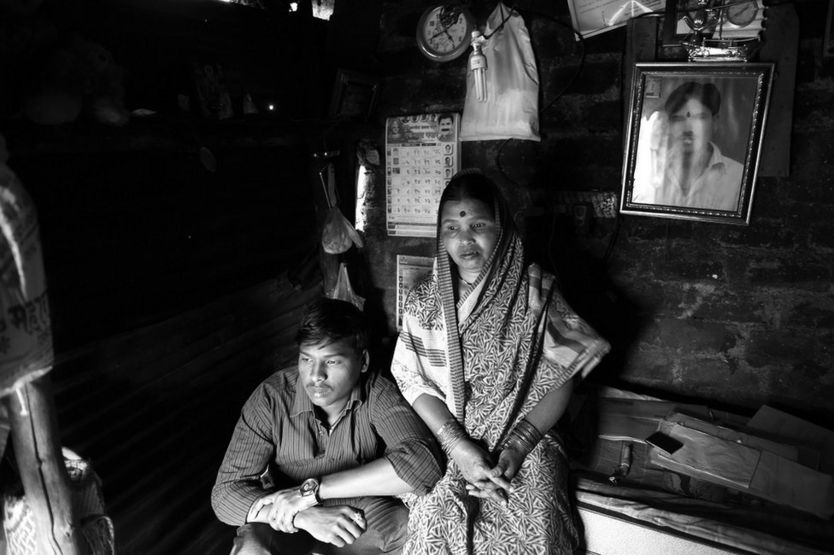
Image caption Manik Udage's brother, Shravan, and his mother
The venue for the event was a neighbourhood in Pune city where many upper-caste families lived. Some of them did not want the event to be held there and asked Mr Udage, a contractor, to shift the venue but he reportedly refused.
His family alleges that four men arrived at their home in the early hours of 1 May and took Mr Udage away. His body was found in a quarry on 3 May.
The four accused, all men from upper castes, are now in jail. They have been denied bail several times. But Mr Udage's brother, Shravan, fears that his family is still under threat. He says he feels nervous every time he passes through the neighbourhood where the families of the accused men live.
Hanging from a tree
Nitin Aage, a 17-year-old boy from a village called Kharda, was found hanging from a tree on 28 April 2014.
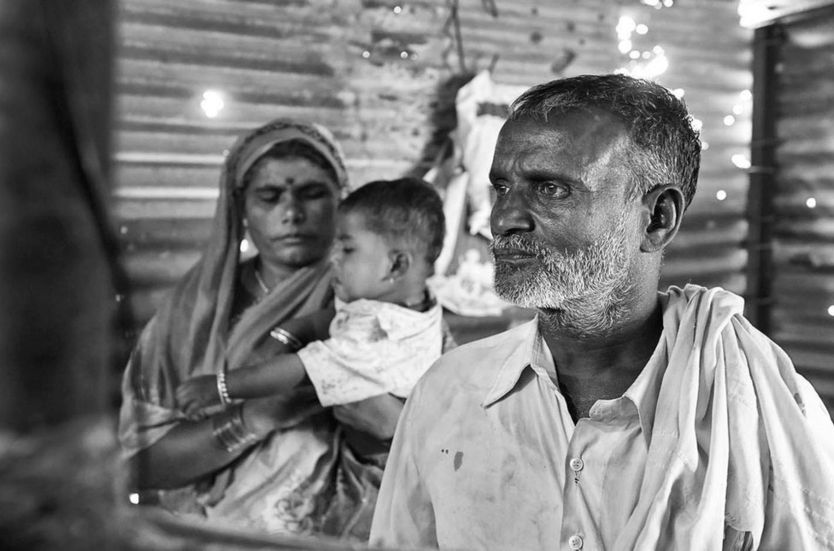
Image caption Nitin Aage's parents
According to the police, Nitin had been seen speaking to a girl from an upper-caste community at their school. Three men, including the girl's brother, had allegedly been harassing him for some time because they suspected he was in a romantic relationship with her.
Police said he was first beaten at the school and then allegedly taken to a property owned by the girl's family where he was strangled to death. They believe he was hanged from a tree to make it appear as if he had taken his own life.
The 13 men who were accused in the murder were acquitted in November 2017. Nitin's family has been demanding a retrial since then.
'Staged to look like suicide'
Sanjay Danane, 38, was found hanging near the school where he worked a school in 2010. His parents allege that he was killed by his upper-caste colleagues because of a dispute at work and that they staged the death to resemble a suicide.
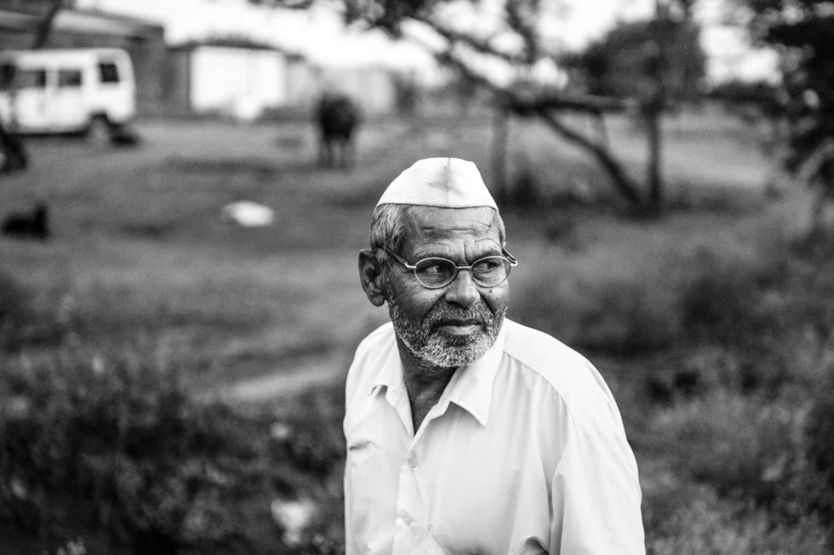
Image caption Sanjay Danane's father
Police arrested about 18 people, including teachers, board members and the school's principal. They have since been granted bail.
Deprived of water supply
Ten-year-old Rajashree Kamble hurt herself on the head when she slipped and fell while fetching water. Her father, Namdev, alleges that his daughter would be alive if the Dalit neighbourhood where they live had received their daily supply of water.
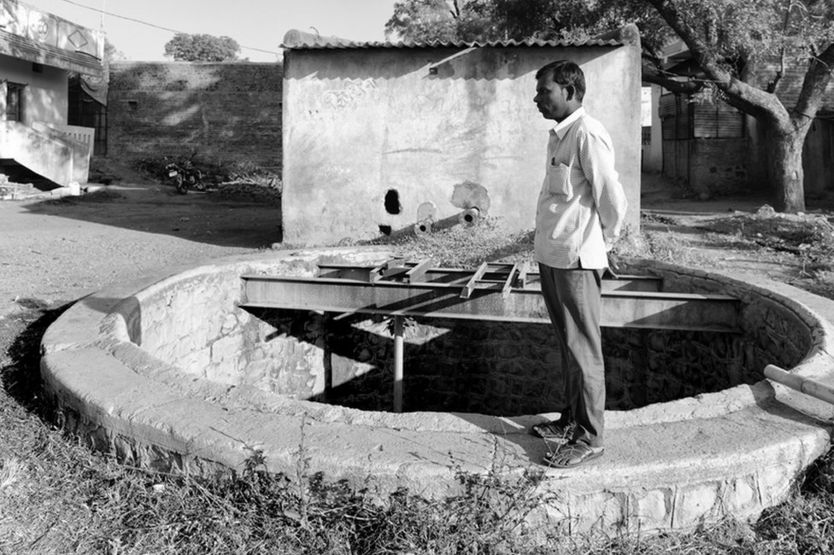
Image caption Rajashree's father, Namdev Kamble
In February 2016, the wells in the village had dried up because of a drought in the region. Mr Kamble says the village council managed to supply water to other neighbourhoods in the village but refused to do the same for his neighbourhood despite repeated requests.
He says he tried to lodge a police complaint against the village head and other officials but he was unable to do so.
'Stabbed for digging a well'
Madhukar Ghadge, 48, was allegedly killed by 12 upper-caste men for digging a well on his land, which was surrounded by lands owned by them.
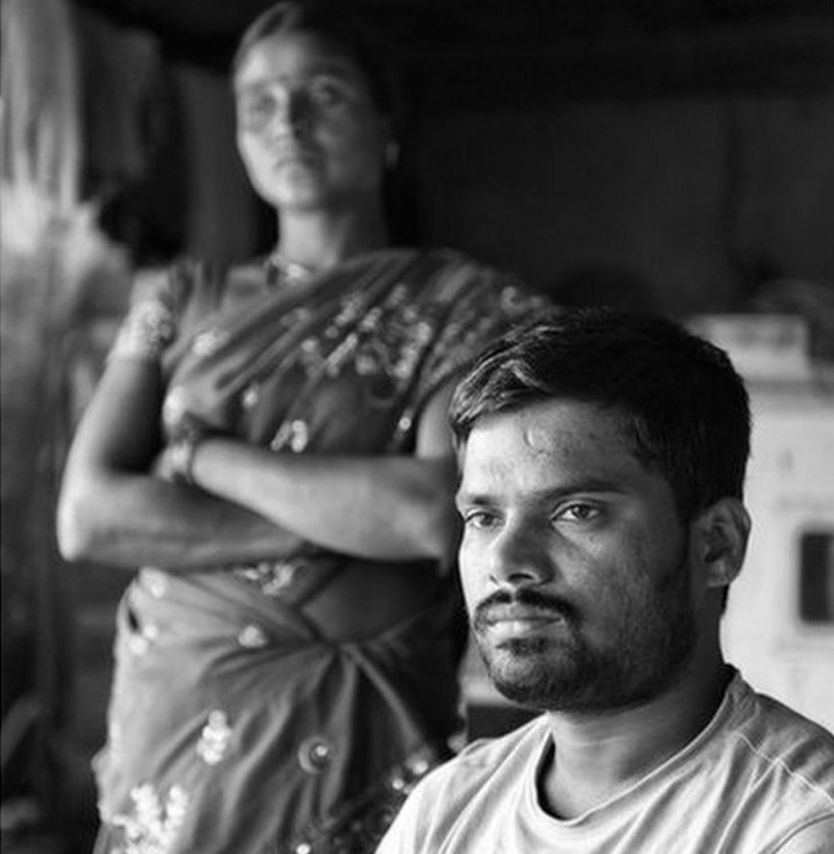
Image caption Madhukar Ghadge's son Tushar
He was allegedly digging the well when he was assaulted with a "spear-like" weapon. His relatives say he was pronounced dead when they arrived at the nearest hospital.
Mr Ghadge's wife and son say his murder was also driven by the fact that theirs was an educated family that was involved in local politics.
Three years later, a lower court acquitted all 12 accused because of lack of evidence. An appeal is still pending in the Mumbai high court.
Beheaded and burnt
The day before he turned 19, on 30 April 2009, Rohan Kakade did not return home. His parents began searching for him and they found his body hours later- he had been beheaded and his body set on fire.
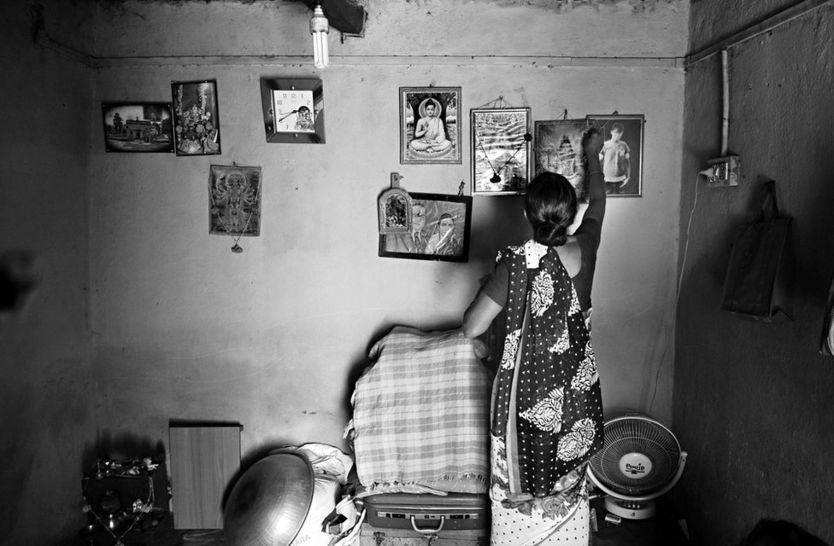
Image caption Rohan's mother
The accused - five upper-caste men - allegedly believed he was in a relationship with one of their sisters. But Mr Kakade's parents say the two were not in love. The girl would occasionally call him and they were friends.
Two-and-half years after Mr Kakade's death, his father died. His mother continued to fight the case but all five accused were acquitted by the courts.
No Muslims, no single women: housing bias turning Indian cities into ghettos

By Rina Chandran
Reuters January 23, 2017

By Rina Chandran
MUMBAI (Thomson Reuters Foundation) - On the inauguration of U.S. President Donald Trump, an Indian real estate company ran an advertisement with the slogan 'Homes that don't discriminate', calling for an end to prejudice in India's housing market based on gender, religion or caste.
While the ad was unusual, the sentiment was familiar to millions of Indians who have tried to rent or buy city homes only to be denied because they were single, ate meat, were of a certain caste or from a certain region.
Informal rules and discrimination by Indian landlords to keep out religious minorities and single people are eroding the multi-cultural nature of India's cities and dividing communities into ghettos, analysts say.
"It's 2017 - and we're still encountering discrimination," said Rishi Dogra of NestAway Technologies that ran the ad.
"People should be able to move freely and find a living space anywhere in the country," said Dogra, marketing head for the company founded by four young male graduates after they had trouble finding a home in Bengaluru.
Such discrimination has forced many people to the suburbs, making Indian city centres less diverse and cosmopolitan, with high rents already making them unaffordable to poorer workers.
Mumbai, India's financial hub and a magnet for migrants from across the country, has traditionally had enclaves for Catholics, Parsis, Bohri Muslims and others. They set up housing societies, or co-operatives, to help other community members.
As the city grew and drew more migrants, powerful housing societies have often denied homes on the basis of religion, caste, food preferences and even professions.
The divide grew after bloody Hindu-Muslim riots in 1992-93 and still persists, said Zakia Soman, a co-founder at Bharatiya Muslim Mahila Andolan, a non-profit organisation for Muslim women.
A Facebook group called 'Indians Against Discrimination' was set up in 2015 after a young Muslim woman was asked to leave her flat a week after she moved in, because of her religion.
"When it comes to living spaces, we have become very insular," Soman said.
"The city is getting increasingly ghettoised as a result, weakening our social fabric and polarising us further. That doesn't bode well," she said.
Local courts have ruled against discrimination by housing associations in several cases, but there have also been contradictory rulings.
DISCRIMINATION
In a 2005 case, India's top court ruled in favour of a Parsi housing society in Ahmedabad, saying it could limit its membership to Parsis and not admit others.
"The constitution guarantees our right to equality, but housing societies can still frame their own guidelines which may be discriminatory," said Vinod Sampat, a real estate lawyer.
A draft housing policy for Maharashtra state, where Mumbai is located, has dropped a clause that prevents discrimination in housing. This may leave those looking to rent or buy property with fewer protections, Sampat said.
Government officials have said non-discrimination is already protected by the constitution, so there is no need for the clause.
That has not reassured people like Shikha Makan, who made a film called 'Bachelor Girls' on housing bias against single women - including Bollywood actors - in Mumbai.
"Not being able to find a home in a big city like Mumbai is a shame," she said.
"It is marginalising single women and other minorities."
(Reporting by Rina Chandran @rinachandran, Editing by Ros Russell. Please credit the Thomson Reuters Foundation, the charitable arm of Thomson Reuters, that covers humanitarian news, women's rights, trafficking, corruption and climate change. Visit news.trust.org to see more stories.)
https://www.bbc.com/news/world-asia-india-43972841
Caste hatred in India - what it looks like
- 7 May 2018

Image caption A photo of Sagar Shejwal
A recent exhibition in the Indian city of Mumbai documented Dalit (formerly known as "untouchable") families that have lost a loved one because of discrimination and violence. The photographs by Sudharak Olwe capture the prejudice that remains a reality for millions of Dalits.
They are some of the country's most downtrodden citizens because of an unforgiving Hindu caste hierarchy that condemns them to the bottom of the heap.
Tens of thousands of Dalits recently took to the streets to protest against a Supreme Court ruling - they said it sought to weaken a law that was designed to protect them.
The court had said that the Scheduled Caste and Scheduled Tribe (Prevention of Atrocities) Act, popularly known as the SC/ST Act, had been "misused" in the past but the order sparked massive outrage and the federal government asked the court to review its decision.
The exhibition's organisers say they chose these stories in response to the court's decision in the hope that the law would not be diluted further. They say these cases - all from the western state of Maharashtra - show that "the victims are ready to fight but there was no mechanism to help them".
Despite the laws to protect Dalits, more than 40,000 crimes against lower castes were reported in 2016 alone, according to official statistics. In the past, conflicts between Dalits and upper castes were restricted to fights over land, wages, water, housing and the practice of untouchability.
However, according to activists, rising aspirations among young Dalits have fuelled violence against them by upper-caste community members who are unable to accept this.
Found in a field
Sagar Shejwal, a 24-year-old nursing student, travelled to the town of Shirdi in May 2015 to attend a friend's wedding. During the trip, Mr Shejwal went to a liquor store with two of his cousins and his phone started to ring while he was there. His ring tone was a song that paid tribute to Dr B R Ambedkar, a Dalit icon and revered Indian leader.

Image caption Sagar Shejwal's mother (L) and sister (R)
According to the police complaint, a group of eight men who had been drinking outside the shop objected to the ring tone and asked him to change it. The verbal spat reportedly turned violent and the men allegedly hit Mr Shejwal with a bottle, kicking and punching him before taking him away on a motorbike.
Police say they found his body hours later in a field. His autopsy showed that he had suffered multiple fractures - allegedly caused by a motorbike being run over him repeatedly.
The accused men have been granted bail.
Found in a quarry
Manik Udage, 25, was allegedly beaten to death with a steel rod in 2014 because he had organised a grand event to celebrate the anniversary of Dr B R Ambedkar's birth.

Image caption Manik Udage's brother, Shravan, and his mother
The venue for the event was a neighbourhood in Pune city where many upper-caste families lived. Some of them did not want the event to be held there and asked Mr Udage, a contractor, to shift the venue but he reportedly refused.
His family alleges that four men arrived at their home in the early hours of 1 May and took Mr Udage away. His body was found in a quarry on 3 May.
The four accused, all men from upper castes, are now in jail. They have been denied bail several times. But Mr Udage's brother, Shravan, fears that his family is still under threat. He says he feels nervous every time he passes through the neighbourhood where the families of the accused men live.
Hanging from a tree
Nitin Aage, a 17-year-old boy from a village called Kharda, was found hanging from a tree on 28 April 2014.

Image caption Nitin Aage's parents
According to the police, Nitin had been seen speaking to a girl from an upper-caste community at their school. Three men, including the girl's brother, had allegedly been harassing him for some time because they suspected he was in a romantic relationship with her.
Police said he was first beaten at the school and then allegedly taken to a property owned by the girl's family where he was strangled to death. They believe he was hanged from a tree to make it appear as if he had taken his own life.
The 13 men who were accused in the murder were acquitted in November 2017. Nitin's family has been demanding a retrial since then.
'Staged to look like suicide'
Sanjay Danane, 38, was found hanging near the school where he worked a school in 2010. His parents allege that he was killed by his upper-caste colleagues because of a dispute at work and that they staged the death to resemble a suicide.

Image caption Sanjay Danane's father
Police arrested about 18 people, including teachers, board members and the school's principal. They have since been granted bail.
Deprived of water supply
Ten-year-old Rajashree Kamble hurt herself on the head when she slipped and fell while fetching water. Her father, Namdev, alleges that his daughter would be alive if the Dalit neighbourhood where they live had received their daily supply of water.

Image caption Rajashree's father, Namdev Kamble
In February 2016, the wells in the village had dried up because of a drought in the region. Mr Kamble says the village council managed to supply water to other neighbourhoods in the village but refused to do the same for his neighbourhood despite repeated requests.
He says he tried to lodge a police complaint against the village head and other officials but he was unable to do so.
'Stabbed for digging a well'
Madhukar Ghadge, 48, was allegedly killed by 12 upper-caste men for digging a well on his land, which was surrounded by lands owned by them.

Image caption Madhukar Ghadge's son Tushar
He was allegedly digging the well when he was assaulted with a "spear-like" weapon. His relatives say he was pronounced dead when they arrived at the nearest hospital.
Mr Ghadge's wife and son say his murder was also driven by the fact that theirs was an educated family that was involved in local politics.
Three years later, a lower court acquitted all 12 accused because of lack of evidence. An appeal is still pending in the Mumbai high court.
Beheaded and burnt
The day before he turned 19, on 30 April 2009, Rohan Kakade did not return home. His parents began searching for him and they found his body hours later- he had been beheaded and his body set on fire.

Image caption Rohan's mother
The accused - five upper-caste men - allegedly believed he was in a relationship with one of their sisters. But Mr Kakade's parents say the two were not in love. The girl would occasionally call him and they were friends.
Two-and-half years after Mr Kakade's death, his father died. His mother continued to fight the case but all five accused were acquitted by the courts.



